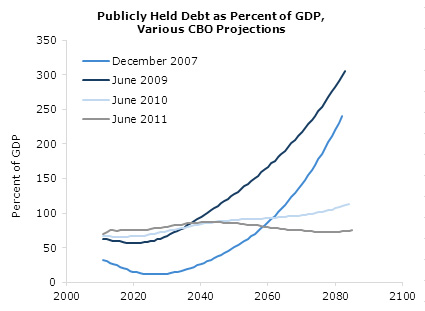•Press Release Affordable Care Act Economic Growth Government
June 22, 2011
Long-term projections show the problem is health care
For Immediate Release: June 22, 2011
Contact: Alan Barber, (202) 293-5380 x115
Washington, D.C.– Dean Baker, co-director of the Center for Economic and Policy Research (CEPR), released the following statement on the latest CBO projections:
“The new long-term budget projections from the Congressional Budget Office (CBO) show once again that the major problem facing the both the budget and the larger economy is out-of-control health care costs, not any inherent fiscal crisis. As was the case last year, the CBO baseline shows that the long-term debt to GDP ratio levels off in the baseline scenario. In the 2011 projections, the ratio of debt to GDP actually begins to decline after the early 2040s. The graph shows the sharp drop in future deficit projections following the passage of the Patient Protection and Affordable Care Act (PPACA) in March of 2010.

“As CBO has pointed out, the baseline projection may be unrealistic since it includes a number of assumptions about policy, such as Congress adhering to the spending caps put into law in the PPACA last year. While no one can know what future Congresses will do, the CBO baseline does show clearly that if health care costs are constrained, as they would be if Congress does not change the law, then there is no real long-term deficit problem. Even with the aging of the population raising the cost of both Social Security and Medicare, the debt to GDP ratio would be on a declining path.
“It is also worth noting that the CBO has clearly indicated that the public sector offers the more promising route for containing health care costs. Its projections of the Medicare voucher plan proposed by Representative Ryan and approved by the House of Representatives show that the plan would raise the cost of providing Medicare-equivalent plans by $34 trillion over the program’s 75-year planning period.
“It is unfortunate that most of the policy community insists on focusing on the deficit and ignoring the fact that the health care system is both the country’s major long-term fiscal problem and economic problem. This is the same sort of momentous mistake as was ignoring the $8 trillion housing bubble that caused the recession as it grew to ever more dangerous levels.”
###